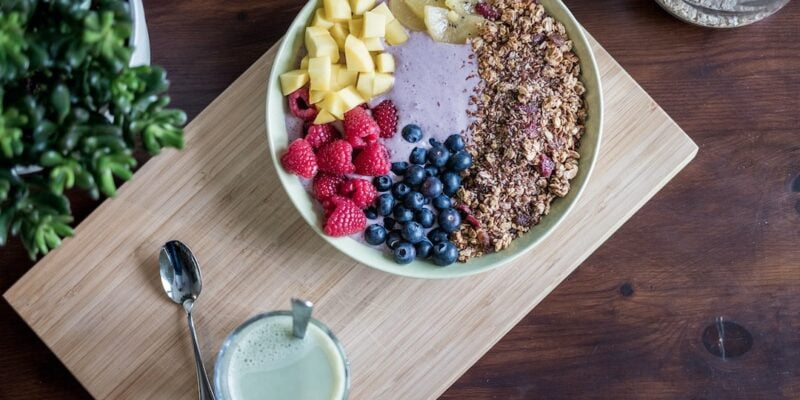
Stay Informed with the Best Nutrition Blogs
Nutrition blogs are online platforms where individuals share information, tips, and advice on healthy eating and nutrition. These blogs are written by experts in the field, such as registered dietitians, nutritionists, and health coaches, as well as individuals who have personal experiences with nutrition and want to share their knowledge with others. The goal of nutrition blogs is to promote healthy eating habits and provide readers with the tools they need to make informed decisions about their diet.
In today’s fast-paced world, where unhealthy food options are readily available and convenience often takes precedence over nutrition, it is more important than ever to have access to reliable information about healthy eating. Nutrition blogs play a crucial role in filling this gap by providing readers with evidence-based information, practical tips, and delicious recipes that can help them make healthier choices. These blogs also serve as a source of inspiration and motivation for individuals who are looking to improve their overall health and well-being.
Key Takeaways
- Nutrition blogs are online platforms that provide information and advice on healthy eating and nutrition.
- Following top nutrition blogs can help you stay informed about the latest trends and research in nutrition.
- Nutrition blogs offer a range of benefits, including expert advice, delicious recipes, and personal stories from bloggers.
- To find reliable and trustworthy nutrition blogs, look for those written by qualified professionals and backed by scientific research.
- Incorporating nutrition blogging into your daily routine can help you make healthier choices and improve your overall well-being.
Top 10 Nutrition Blogs You Should Be Following Right Now
1. Nutrition Stripped: This blog, created by registered dietitian McKel Hill, focuses on whole foods and plant-based recipes. Hill provides readers with practical tips on how to incorporate more fruits, vegetables, and whole grains into their diet. What sets Nutrition Stripped apart is its emphasis on mindful eating and self-care.
2. The Full Helping: Created by registered dietitian Gena Hamshaw, The Full Helping offers a wide range of vegan recipes that are both nutritious and delicious. Hamshaw also provides readers with tips on meal planning and how to make the most of their time in the kitchen.
3. Oh She Glows: Angela Liddon, the creator of Oh She Glows, shares her journey towards a plant-based diet and provides readers with a variety of vegan recipes that are easy to make and packed with flavor. Liddon also offers tips on how to stock a plant-based pantry and make healthy choices when dining out.
4. Minimalist Baker: This blog, created by Dana Shultz, focuses on simple and delicious recipes that require 10 ingredients or less, one bowl, or 30 minutes or less to prepare. Shultz also provides readers with tips on how to make healthier versions of their favorite comfort foods.
5. Green Kitchen Stories: Created by David Frenkiel and Luise Vindahl, Green Kitchen Stories offers a variety of vegetarian recipes that are both nutritious and visually appealing. Frenkiel and Vindahl also share their personal stories and experiences with food, which adds a personal touch to the blog.
6. Naturally Ella: Erin Alderson, the creator of Naturally Ella, focuses on whole foods and seasonal ingredients. She provides readers with a variety of vegetarian recipes that are easy to make and packed with flavor. Alderson also offers tips on meal planning and how to make the most of your grocery budget.
7. Cookie and Kate: This blog, created by Kathryne Taylor, offers a variety of vegetarian recipes that are both healthy and delicious. Taylor also provides readers with tips on how to make the most of their farmers’ market finds and reduce food waste.
8. Fit Foodie Finds: Created by Lee Hersh, Fit Foodie Finds offers a wide range of healthy recipes that are easy to make and packed with flavor. Hersh also provides readers with tips on meal planning, fitness, and overall wellness.
9. The Healthy Maven: Davida Lederle, the creator of The Healthy Maven, focuses on real food recipes that are both nutritious and delicious. Lederle also provides readers with tips on how to live a balanced lifestyle and make healthier choices.
10. Ambitious Kitchen: This blog, created by Monique Volz, offers a variety of healthy recipes that are easy to make and packed with flavor. Volz also provides readers with tips on meal planning, fitness, and overall wellness.
The Benefits of Staying Informed About Nutrition Through Blogs
Staying informed about nutrition is essential for maintaining good health and preventing chronic diseases. Nutrition blogs offer a wealth of information on topics such as macronutrients, micronutrients, portion sizes, and the impact of different foods on our bodies. By staying informed about nutrition through blogs, you can make more informed decisions about your diet and improve your overall health.
One of the benefits of using blogs as a source of information is that they are easily accessible and can be accessed at any time. Unlike traditional sources of nutrition information, such as books or scientific journals, blogs are updated regularly with new information and research findings. This means that you can stay up-to-date with the latest trends and research in nutrition without having to wait for a new edition of a book or journal to be published.
Another benefit of using blogs as a source of information is that they often provide practical tips and advice that can be easily implemented into your daily life. Many nutrition blogs offer recipes, meal plans, and shopping lists that can help you make healthier choices and improve your overall diet. These resources can be particularly helpful for individuals who are looking to make changes to their diet but are unsure where to start.
How to Find Reliable and Trustworthy Nutrition Blogs
With so many nutrition blogs available online, it can be challenging to determine which ones are reliable and trustworthy. Here are some tips for finding reliable and trustworthy nutrition blogs:
1. Look for credentials: Check if the author of the blog has any credentials in the field of nutrition, such as being a registered dietitian or nutritionist. These credentials indicate that the author has received formal education and training in nutrition.
2. Check for references: Look for references or citations in the blog posts. Reliable and trustworthy nutrition blogs will often cite scientific studies or other reputable sources to support their claims.
3. Consider the tone and language used: Reliable and trustworthy nutrition blogs will use a balanced and evidence-based approach when discussing nutrition topics. They will avoid making exaggerated claims or promoting fad diets.
4. Look for transparency: Reliable and trustworthy nutrition blogs will be transparent about their sources of information and any potential conflicts of interest. They will also provide readers with information on how to contact them if they have any questions or concerns.
5. Check for updates: Reliable and trustworthy nutrition blogs will be regularly updated with new information and research findings. Look for blogs that are updated at least once a week to ensure that you are getting the most up-to-date information.
Warning signs of unreliable nutrition blogs include:
1. Promoting fad diets or extreme eating patterns: Blogs that promote fad diets or extreme eating patterns, such as detoxes or cleanses, should be approached with caution. These diets are often not based on scientific evidence and can be harmful to your health.
2. Making exaggerated claims: Blogs that make exaggerated claims, such as promising quick weight loss or a cure for a specific health condition, should be approached with skepticism. Reliable and trustworthy nutrition blogs will provide balanced and evidence-based information.
3. Lack of references or citations: Blogs that do not provide references or citations to support their claims should be approached with caution. Reliable and trustworthy nutrition blogs will provide readers with the sources of their information so that they can verify the accuracy of the information.
4. Pushing products or supplements: Blogs that heavily promote specific products or supplements should be approached with caution. These blogs may have a financial incentive to promote these products, which can compromise the reliability and trustworthiness of the information provided.
Expert Advice and Tips on Healthy Eating and Nutrition
Nutrition blogs are a valuable source of expert advice and tips on healthy eating and nutrition. Here are some examples of expert advice and tips from nutrition blogs:
1. Focus on whole foods: Many nutrition blogs emphasize the importance of eating whole foods, such as fruits, vegetables, whole grains, and lean proteins. These foods are nutrient-dense and provide the body with the essential vitamins, minerals, and antioxidants it needs to function properly.
2. Practice portion control: Portion control is an important aspect of maintaining a healthy diet. Many nutrition blogs provide tips on how to practice portion control, such as using smaller plates, measuring out serving sizes, and being mindful of hunger and fullness cues.
3. Include a variety of foods in your diet: Eating a variety of foods ensures that you are getting a wide range of nutrients. Many nutrition blogs provide tips on how to incorporate a variety of foods into your diet, such as trying new fruits and vegetables, experimenting with different grains and legumes, and incorporating different types of protein sources.
4. Stay hydrated: Staying hydrated is essential for overall health and well-being. Many nutrition blogs provide tips on how to stay hydrated, such as drinking water throughout the day, incorporating hydrating foods into your diet, and avoiding excessive consumption of sugary beverages.
5. Practice mindful eating: Mindful eating is the practice of paying attention to the present moment while eating, without judgment or distraction. Many nutrition blogs provide tips on how to practice mindful eating, such as eating slowly, savoring each bite, and paying attention to hunger and fullness cues.
6. Plan your meals: Meal planning can help you make healthier choices and save time in the kitchen. Many nutrition blogs provide tips on how to plan your meals, such as creating a weekly meal plan, prepping ingredients in advance, and batch cooking.
7. Listen to your body: Your body knows what it needs. Many nutrition blogs emphasize the importance of listening to your body’s hunger and fullness cues and eating in response to these cues.
8. Practice self-care: Taking care of your physical and mental well-being is an important aspect of maintaining a healthy diet. Many nutrition blogs provide tips on how to practice self-care, such as getting enough sleep, managing stress, and engaging in activities that bring you joy.
Understanding the Latest Trends and Research in Nutrition
The field of nutrition is constantly evolving, with new research findings and trends emerging all the time. Nutrition blogs can help you stay up-to-date with the latest trends and research in nutrition. Here is an overview of some of the latest trends and research in nutrition:
1. Plant-based diets: Plant-based diets, which focus on consuming mostly or exclusively plant-based foods, have gained popularity in recent years. Research has shown that plant-based diets can have numerous health benefits, including a reduced risk of chronic diseases such as heart disease, diabetes, and certain types of cancer.
2. Gut health: The gut microbiome, which is the collection of microorganisms that live in our digestive tract, has been the subject of much research in recent years. Emerging evidence suggests that a healthy gut microbiome is essential for overall health and well-being and may play a role in the prevention and treatment of various diseases.
3. Intermittent fasting: Intermittent fasting is an eating pattern that involves alternating periods of fasting and eating. Research has shown that intermittent fasting can have numerous health benefits, including weight loss, improved insulin sensitivity, and reduced inflammation.
4. Personalized nutrition: Personalized nutrition is the concept of tailoring dietary recommendations to an individual’s unique genetic makeup, lifestyle, and health goals. Advances in technology, such as genetic testing and wearable devices, are making personalized nutrition more accessible.
5. Sustainable eating: Sustainable eating refers to making food choices that are both healthy for individuals and environmentally friendly. This includes choosing foods that have a lower carbon footprint, reducing food waste, and supporting local and sustainable food systems.
Nutrition blogs can help you understand these trends and research findings by providing you with evidence-based information and practical tips on how to incorporate them into your daily life.
Delicious and Nutritious Recipes to Try at Home
One of the highlights of nutrition blogs is the wide variety of delicious and nutritious recipes they offer. Here are some examples of recipes from nutrition blogs:
1. Quinoa Salad with Roasted Vegetables: This recipe from Nutrition Stripped combines roasted vegetables, quinoa, and a tangy lemon dressing for a flavorful and nutritious salad.
2. Sweet Potato Black Bean Enchiladas: This recipe from The Full Helping features sweet potatoes, black beans, and a homemade enchilada sauce for a hearty and satisfying meal.
3. Creamy Vegan Tomato Soup: This recipe from Oh She Glows uses cashews to create a creamy texture without the need for dairy. It is perfect for a cozy night in.
4. One-Pot Chickpea Curry: This recipe from Minimalist Baker is quick and easy to make, with just one pot required. It is packed with flavor and perfect for a weeknight dinner.
5. Lentil Bolognese: This recipe from Green Kitchen Stories uses lentils as a plant-based alternative to meat in a classic Bolognese sauce. It is hearty, flavorful, and perfect for pasta night.
6. Butternut Squash Risotto: This recipe from Naturally Ella combines creamy butternut squash with Arborio rice for a comforting and delicious risotto.
7. Mediterranean Quinoa Salad: This recipe from Cookie and Kate features quinoa, cucumbers, tomatoes, olives, and feta cheese for a refreshing and nutritious salad.
8. Peanut Butter Banana Smoothie Bowl: This recipe from Fit Foodie Finds combines frozen bananas, peanut butter, and almond milk for a creamy and satisfying smoothie bowl.
9. Chocolate Avocado Mousse: This recipe from The Healthy Maven uses avocados as a base for a rich and creamy chocolate mousse. It is a healthier alternative to traditional chocolate mousse.
10. Blueberry Oatmeal Muffins: This recipe from Ambitious Kitchen combines oats, blueberries, and Greek yogurt for a nutritious and delicious breakfast or snack.
These recipes can be easily incorporated into your diet and are a great way to add variety and flavor to your meals.
Personal Stories and Experiences from Nutrition Bloggers
Many nutrition bloggers share their personal stories and experiences with food, health, and wellness. These stories can be inspiring and motivating for readers who are looking to make changes to their diet and lifestyle. Here are some examples of personal stories and experiences from nutrition bloggers:
1. Overcoming an eating disorder: Many nutrition bloggers have personal experiences with eating disorders and share their journey towards recovery. These stories can provide hope and inspiration for individuals who are struggling with their relationship with food.
2. Weight loss journeys: Some nutrition bloggers share their personal weight loss journeys and provide tips and advice on how to achieve sustainable weight loss. These stories can be motivating for individuals who are looking to lose weight in a healthy way.
3. Managing chronic diseases: Many nutrition bloggers have personal experiences with chronic diseases, such as diabetes or autoimmune conditions, and share their strategies for managing these conditions through diet and lifestyle changes. These stories can provide valuable insights for individuals who are also dealing with similar health issues. By sharing their personal experiences, nutrition bloggers can offer practical tips and advice on how to navigate the challenges of living with a chronic disease. They may discuss specific dietary modifications, such as following a low-carb or anti-inflammatory diet, that have helped them manage their symptoms and improve their overall well-being. Additionally, they may provide guidance on incorporating exercise, stress management techniques, and other lifestyle changes into their daily routine to support their health goals. Overall, these bloggers serve as a source of inspiration and support for individuals seeking to take control of their chronic diseases and improve their quality of life.
Stay informed with the best nutrition blogs by checking out this article on “The Impact of Sodium and Ways to Reduce Salt Intake.” In this informative piece, you’ll learn about the detrimental effects of excessive sodium consumption on your health and discover practical tips to lower your salt intake. Understanding the importance of maintaining a balanced diet is crucial for optimal cardiovascular health, which is why it’s essential to read articles like this one. So, click here to gain valuable insights and make informed choices about your nutrition. (source)
FAQs
What are nutrition blogs?
Nutrition blogs are online platforms that provide information and advice on healthy eating, dieting, and nutrition. They are written by nutritionists, dietitians, and other health professionals who share their knowledge and expertise on various topics related to food and nutrition.
Why should I read nutrition blogs?
Reading nutrition blogs can help you stay informed about the latest research and trends in the field of nutrition. They can also provide you with practical tips and advice on how to improve your diet and overall health.
What are some of the best nutrition blogs?
There are many great nutrition blogs out there, but some of the most popular and highly recommended ones include Precision Nutrition, Authority Nutrition, Nutrition Stripped, and The Real Food Dietitians.
Are nutrition blogs reliable sources of information?
While not all nutrition blogs are created equal, many of them are written by qualified professionals who base their advice on scientific research and evidence-based practices. It’s important to do your own research and check the credentials of the author before taking any advice.
Can nutrition blogs help me lose weight?
Yes, many nutrition blogs offer advice on healthy eating and weight loss. However, it’s important to remember that sustainable weight loss requires a combination of healthy eating habits, regular exercise, and lifestyle changes.


















